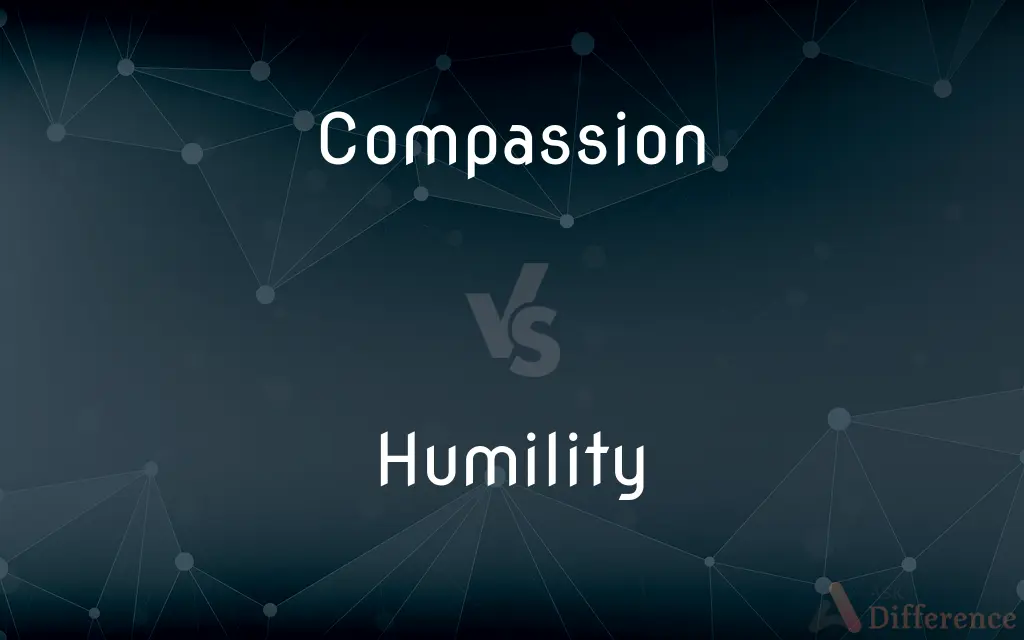Compassion vs. Humility — What's the Difference?
By Urooj Arif & Maham Liaqat — Updated on March 25, 2024
Compassion involves empathy and concern for others' suffering, while humility is about modesty and a lack of ego.

Difference Between Compassion and Humility
Table of Contents
ADVERTISEMENT
Key Differences
Compassion is the emotional response of empathy and concern we feel towards the suffering of others, driving us to offer help or support. In contrast, humility is a personal quality characterized by a modest view of one's importance, often leading one to place the needs or interests of others before their own.
While compassion motivates one to take action to alleviate someone else's distress, humility involves recognizing one's limitations and the value of others without seeking personal recognition. Compassion is outward-facing, focusing on the feelings and well-being of others, whereas humility is more inward, reflecting on one's own place in the world and acknowledging one's faults and virtues alike.
Compassion can be seen in acts of kindness and generosity towards those in need, driven by a genuine concern for their welfare. On the other hand, humility manifests in acknowledging others' contributions, accepting criticism gracefully, and downplaying one's achievements in favor of communal harmony.
Both compassion and humility are considered virtues and are often interrelated; a humble person may be more likely to act with compassion, recognizing the shared human condition. Similarly, acts of compassion can foster humility by reminding individuals of their interconnectedness with others and the broader world.
Despite their differences, both compassion and humility enhance interpersonal relationships and social cohesion by promoting understanding, respect, and care among individuals.
ADVERTISEMENT
Comparison Chart
Definition
Empathy and concern for others' suffering
Modesty and recognizing one's limitations
Focus
Alleviating others' distress
Understanding one's place and value
Expression
Acts of kindness and support
Acknowledging others, accepting criticism
Orientation
Outward towards others
Inward, self-reflective
Relationship
Often leads to helping behaviors
Promotes communal harmony and self-awareness
Compare with Definitions
Compassion
Feels deeply for others in distress.
Her compassion moved her to volunteer at the shelter.
Humility
Involves a realistic assessment of one's abilities and achievements.
His humility is evident in how he credits his team for successes.
Compassion
Strengthens bonds by showing care.
Their compassion for each other deepened their friendship.
Humility
Not seeking the spotlight or personal gain.
Despite her achievements, she remained humble, avoiding arrogance.
Compassion
Recognized across cultures as a moral quality.
Compassion is central to many spiritual and ethical traditions.
Humility
Engenders respect and cooperation from others.
The leader's humility inspired loyalty and respect among her team.
Compassion
Promotes a sense of community and support.
The community's compassion was evident in their response to the crisis.
Humility
Values and acknowledges the contributions of others.
Her humility shines when she speaks of her mentors with gratitude.
Compassion
Drives one to alleviate the suffering of others.
His compassion led to organizing a fundraiser for disaster relief.
Humility
Accepts criticism and learns from it.
His humility allows him to grow from feedback without defensiveness.
Compassion
Compassion motivates people to go out of their way to help the physical, mental, or emotional pains of another and themselves. Compassion is often regarded as having sensitivity, which is an emotional aspect to suffering.
Humility
Humility is the quality of being humble. Dictionary definitions accentuate humility as a low self-regard and sense of unworthiness.
Compassion
Sympathetic pity and concern for the sufferings or misfortunes of others
The victims should be treated with compassion
Humility
The quality or condition of being humble.
Compassion
Deep awareness of the suffering of another accompanied by the wish to relieve it.
Humility
The characteristic of being humble; humbleness in character and behavior.
Compassion
Deep awareness of the suffering of another, coupled with the wish to relieve it.
Humility
The state or quality of being humble; freedom from pride and arrogance; lowliness of mind; a modest estimate of one's own worth; a sense of one's own unworthiness through imperfection and sinfulness; self-abasement; humbleness.
Serving the Lord with all humility of mind.
Compassion
(obsolete) To pity.
Humility
An act of submission or courtesy.
With these humilities they satisfied the young king.
Compassion
Literally, suffering with another; a sensation of sorrow excited by the distress or misfortunes of another; pity; commiseration.
Womanly ingenuity set to work by womanly compassion.
Humility
A disposition to be humble; a lack of false pride;
Not everyone regards humility as a virtue
Compassion
To pity.
Humility
A humble feeling;
He was filled with humility at the sight of the Pope
Compassion
A deep awareness of and sympathy for another's suffering
Compassion
The humane quality of understanding the suffering of others and wanting to do something about it
Common Curiosities
How do compassion and humility complement each other?
Compassion and humility can interplay beautifully, as humility opens the heart to the suffering of others, fostering compassionate actions.
Can one be compassionate without being humble?
Yes, it's possible to feel and act with compassion without being humble, though the two often coexist in empathetic individuals.
How can cultivating compassion impact one's life?
Cultivating compassion can deepen relationships, enhance well-being, and contribute to a more empathetic society.
Why is humility important in leadership?
Humility in leadership fosters a collaborative environment, encourages open communication, and makes leaders more approachable.
Is compassion always emotional, or can it be rational?
Compassion can be both an emotional response and a rational decision to act kindly and supportively towards others.
How does one practice humility?
Practicing humility involves reflecting on one's limitations, being open to learning, and valuing others' contributions.
What role does culture play in valuing compassion and humility?
Cultural values and norms influence the emphasis placed on compassion and humility, with some cultures holding them in higher regard.
How does one balance humility with self-confidence?
Balancing humility with confidence involves recognizing one's abilities without overestimating them or seeking undue attention.
Are compassion and humility innate or learned?
Both traits can be innate to some degree but are also cultivated through personal experiences and conscious practice.
Is humility a form of self-deprecation?
No, humility is not about belittling oneself but about having a realistic and modest view of one's importance and abilities.
How do social media and technology impact expressions of compassion and humility?
They can both enhance and diminish genuine expressions, depending on how individuals choose to use these platforms.
What are the societal benefits of promoting compassion and humility?
Promoting these virtues can lead to a more empathetic, respectful, and cohesive society, reducing conflicts and enhancing collective well-being.
Can too much compassion be harmful?
Excessive compassion without boundaries can lead to emotional burnout; balance is key.
Can humility be seen as a weakness in competitive environments?
While some may perceive it as such, humility can actually be a strength, leading to more sustainable success and team cohesion.
How do compassion and humility affect interpersonal relationships?
They promote understanding, respect, and care, strengthening bonds and fostering positive social interactions.
Share Your Discovery

Previous Comparison
Malarky vs. Malarkey
Next Comparison
Grammarian vs. GrammaticianAuthor Spotlight
Written by
Urooj ArifUrooj is a skilled content writer at Ask Difference, known for her exceptional ability to simplify complex topics into engaging and informative content. With a passion for research and a flair for clear, concise writing, she consistently delivers articles that resonate with our diverse audience.
Co-written by
Maham Liaqat















































